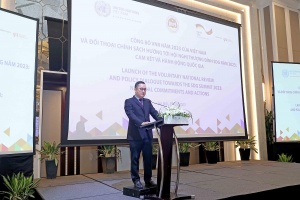The economics of nature: How to integrate natural capital into policy
Many economists, and the policymakers they advise, have long taken nature for granted. Natural capital – the umbrella term for renewable and non-renewable resources, including minerals, soil, air, water, and all living things – is missing in most economic modelling and policymaking.
 |
| Lei Lei Song, Director Economic Analysis and Operational Support Division Asian Development Bank |
However, nature provides goods and services that contribute directly or indirectly to a country’s economic output and human wellbeing. More critically, nature supports life. Forests, wetlands, rivers, lakes, coral reefs, and other ecosystems provide goods such as food, fuel, and clean water.
Nature also provides cultural services, such as recreation and spiritual values, as well as invisible, regulatory, and supporting services such as nutrient cycling, pollination, protection from natural hazards, and climate regulation.
The genetic diversity in the planet’s living organisms is a global public good, offering valuable future options for life in different circumstances. Humanity is part of nature, and natural capital is essential and critical to us.
The role of nature in keeping our societies healthy, safe, and prosperous, has been taken for granted. We tend to assume that nature and ecosystems are free – it costs nothing to destroy a forest, deplete water resources or pollute land and air. With no costs attached, our demands on nature have been growing exponentially.
When human demands for ecosystem goods and services are within what nature can regenerate and maintain on a sustainable basis, it might be alright to assume ecosystems are a constant that does not vary in economic models. However, after the industrial revolution 200 years ago, the demand humanity makes on nature has far exceeded the ability of nature to regenerate and maintain.
When the demand outstrips the supply, ecosystems can only meet that supply by deteriorating themselves. In the past two centuries, human society has accumulated a huge wealth of produced capital such as buildings, machinery, roads and ports, and human capital, but at a significant expense of degradation of natural capital.
A clear and most urgent issue is climate change or global warming. The atmosphere is a sink for our pollutants, including carbon emissions, and many ecosystems absorb and sequester carbon.
Yet, driven by socioeconomic growth, our carbon emissions have been so large that the accumulation of carbon in the atmosphere has led to significant global warming in the past few decades. Climate change has become the biggest threat to nature and humanity.
Rising global temperature is destroying flora and fauna at unprecedented rates. Asia-Pacific is one of the most biodiverse regions in the world. However, many ecosystems in the region, from tropical forests to coral reefs, have already been degraded beyond repair or are at imminent risk of reaching tipping points.
What should be done? First, we need to better understand the status of natural capital and better measure and value the stock of natural capital and goods and services it provides. We have some understanding, such as forest coverages, but more systematic work needs to be done. Without certain measurement of natural capital, it would be difficult to incorporate natural capital in economic modelling and policymaking.
We need to change the valuation, pricing and risk approach to ensure that ecosystems and biodiversity are accorded their true worth. Only then can we make informed decisions that would increase the global stock of natural capital and supply of ecosystem goods and services.
Second, we should try to reduce the demand and increase the supply. In other words, we must increase nature’s ability to supply goods and services to meet our demands. We must cut our demands on nature and, particularly, early action is required to ensure a global transition to net-zero emissions of greenhouse gases.
We must invest in nature and replenish the stock of natural capital. Plant trees and protect coastal marine areas. Allow nature to recover from assaults that we have been making on it, and offer it assistance to regenerate. There are nature-based solutions for regenerating the vitality of ecosystems such as wetlands or coastal fisheries, including removing waste, and cleaning up rubbish and plastics.
Third, financing for natural capital needs to be mobilised internationally and domestically. Investing in nature costs money. As nature loss and environmental degradation reduce economic output in poor and indebted countries, it will become harder for them to service debt and spend on nature, leading to a downward spiral of high debt, poor economic performance, no investment in nature, and further degradation of natural capital. We need to break the vicious cycle.
Restructuring unsustainable levels of debt is necessary to regain access to financial markets, and some countries have incorporated natural capital in their debt restructuring. It is also possible to monetise natural capital through financial markets and mobilise financing for investment in nature. There are also early examples of utilising nationally determined contributions as part of international bond issuance.
Nature has been largely missing in economics and decision-making for too long. As a result, human demands on nature have far exceeded what nature can regenerate and maintain. Urgent action is needed to reverse the devastating trend, and natural capital has been taken seriously in recent years.
Multilateral development banks are doing their part, with commitments made to further integrate nature into their policies, analysis, assessments, advice, investments, and operations.
We need to better understand the status of natural capital, measure the stock of natural capital, and value ecosystem goods and services. Working together, we can help ensure that ecosystems can thrive and that future generations can enjoy a healthy, safe, prosperous, and sustainable planet.
 | Launch of Voluntary National Review and policy dialogue on SDG Summit 2023 A national review was held in Hanoi on August 25 in preparation for an upcoming United Nations' summit on sustainable development goals. |
 | Vietnam’s fiscal policy can perform a stronger role High interest rates elsewhere have led to consumption and export issues. Suan Teck Kin, head of Research at UOB, shared with VIR’s Nhue Man his prospects on Vietnam’s development and its monetary policies to face to the impact of activity involving China and the United States. |
What the stars mean:
★ Poor ★ ★ Promising ★★★ Good ★★★★ Very good ★★★★★ Exceptional
Related Contents
Latest News
More News
- 14th National Party Congress marks new era, expands Vietnam’s global role: Australian scholar (January 25, 2026 | 09:54)
- French Communist Party highlights 14th National Party Congress as strategic milestone (January 23, 2026 | 09:19)
- Leaders must rediscover discipline of engagement (January 22, 2026 | 11:08)
- IP alterations shape asset strategies for local investors (January 22, 2026 | 10:00)
- 14th National Party Congress: Vietnam - positive factor for peace, sustainable development (January 22, 2026 | 09:46)
- Japanese legislator confident in CPV's role in advancing Vietnam’s growth (January 22, 2026 | 09:30)
- 14th National Party Congress: France-based scholar singles out institutional reform as key breakthrough (January 21, 2026 | 09:59)
- 14th National Party Congress: Promoting OV's role in driving sustainable development (January 20, 2026 | 09:31)
- 14th National Party Congress affirms Party’s leadership role, Vietnam’s right to self-determined development (January 20, 2026 | 09:27)
- Direction ahead for low-carbon development finance in Vietnam (January 14, 2026 | 09:58)

 Tag:
Tag:



















 Mobile Version
Mobile Version